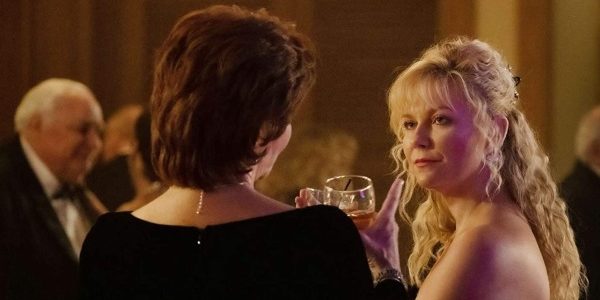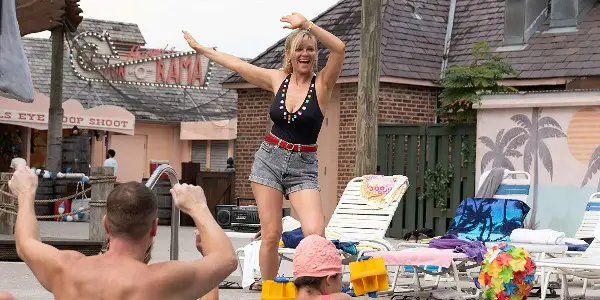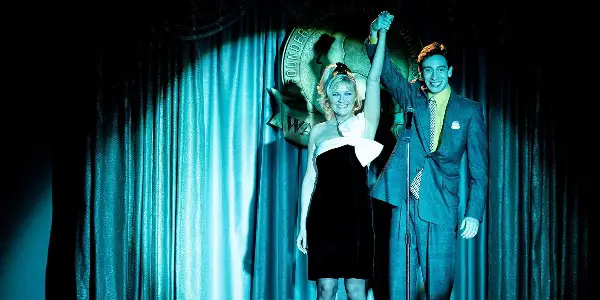ON BECOMING A GOD IN CENTRAL FLORIDA Season 1: The New Show You Shouldn’t Miss This Year

Reyzando Nawara is a passionate film and TV enthusiast from…
It is often said that money is everything. And although it’s not entirely true, we can’t dismiss the fact that money is indeed important. Sure, it can’t buy us happiness, but aside from helping us cover our basic expenses — food, shelter, clothes — money also gives us freedom and choices, security and safety. Basically, everyone needs money to help them create a better life, especially in a world dominated by capitalism. But on the other hand, money can also bring huge issues such as class segregation and even corruption, where the haves are trying to do literally anything to feed their obsession for wealth and money, while the have-nots are constantly being shoved down the socioeconomic ladder created by capitalism.
This scenario is certainly not new anymore in films and/or TV. In fact, this on-going issue of class division between the haves and the have-nots has became a sub-genre of its own. Last year, Lee Chang-dong’s Burning and Hirokazu Koreeda’s Shoplifters explored this issue in two distinct ways, while this year, it is Bong Joon-ho’s Palme d’or winning Parasite that becomes the pioneer. While most of it, including the three aforementioned titles, are still mainly focused on taking down the rich. Showtime’s new tragicomic series On Becoming a God in Central Florida, a weird, compelling, and surreal show about the dark side of American dream, manages to find a new ground in the sub-genre by leaning more on the chaos and danger created by the infamous pyramid scheme in the early 1990s rather than creating another observation on class gap. And as a result, not only does this new show feel refreshing in and of itself, it also morphs into a tragic look of the impact that money can give over to human beings.
The False Promise of American Dream
Created by Robert Funke and Matt Lutsky, On Becoming a God in Central Florida is set in an Orlando-adjacent town circa 1990s, where Kirsten Dunst’s (also an EP) Krystal Stubbs, a ferocious water park employee and a former beauty pageant queen, has just recently been widowed after her husband Travis (Alexander Skarsgård in yet another dead husband role) is murdered by a gator while on his way to sell the product of a cultish multilevel-marketing “company” called FAM. Left with massive debt and an infant to take care of by herself, Krystal sets out to take revenge on FAM by getting involved actively in the company itself while trying to maintain her job in the water park so that she can keep providing her baby. She assumes that by furthering herself in the scheme, she gets to expose what a scam FAM is and has her stability back. But the further she’s in, the more trapped she becomes, not to mention the temptation she also has to endure.

The show brilliantly uses FAM as a representation of how dangerous it is to dream in America, a place filled by fishy capitalists who only care about themselves and how much money they can get every month while shouting to the whole world that every successful American is self-made, especially to the lower-middle working class. This idea is emphasised even more by the tragic fate of Krystal’s husband Travis, a former insurance agent who’s lured by the financial freedom and the sweet promise of the American ending that FAM offers him through a series of motivation tapes by the mustachioed frontman of FAM itself, Obie Garbeau II (Ted Levine), which gives him the idea to quit his job even though Krystal tells him not to. The point that the show is making here is not fixate on the stupid choice that Travis decides, but rather on how his choice mirrors the damage created by American capitalism itself, where the rich are getting richer by squeezing the juice out of the poor using unreal promises of the American dream without ever thinking of how harmful their oppression is toward the people who trust them.
It is quite devastating, but it is what happens every day in every corner of the world. And On Becoming a God in Central Florida clearly understands that, because it manages to use every source they can get to give a middle finger toward this big issue without being too self-aware. In fact, the show also brilliantly uses plenty of whimsical elements to accentuate its statement that the American dream is actually just nothing more than a fantasy and that the Garbeau System FAM provides to people is nothing than a fairy tale. Be it a man who kills a pelican with his bare hand or a bath of glowing ball used to make people feel reborn, everything in the show is just a vision of how weird and absurd the fairy tale of American ending could ever be.
Krystal Is Every Woman
Yet, no matter how strange the series might be in each episode, everything is so throughly grounded in Krystal and her determination to avenge FAM for ruining her life and family. Here’s where the series gets really interesting, instead of projecting Krystal’s grief and rage into a predictable story of a desperate woman taking down a whole pyramid scheme so that others won’t spiral down the same mistake that her husband did, Krystal is depicted as a very flawed woman who just wants nothing more than stability in her life but became fed up by the cruel impact of capitalism that FAM is.
We know from the get go that becoming rich isn’t her goal, it is not being poor that’s always been her number one goal. “I will not be poor again!” says Krystal in the first episode. She appreciates what she already has and is not asking too much from Travis. So when FAM begins to take the only thing that she has at the moment, a stability, she decides to take it back away from them, even if it means that she has to continue working the system from the inside and climb the Garbeau ladder by preying on her neighbour Ernie’s vulnerabilities for her own advantage. Yes, in a way, what she does is not that different from Obie himself, but whereas Obie’s reason is solely on getting more money, the main motivation for Krystal has always been about her family.

It’s easy to see that Krystal isn’t always a person who makes good choices, but the show never once endorses her flaw or condemns it. Instead, Krystal’s arc throughout the season is to display the extreme length that a mother is willing to take for the safety and comfort of her own child. She is, after all, just a survivor and a mother. And Kirsten Dunst is able to show that human side of Krystal in a very compelling way without jettisoning the part that makes her thick. Her performance dances between feral intensity and complex vulnerabilities, and it should be in every Emmy conversation for next year.
Insecurity and Need for Approval Make Dangerous Bedfellows
Unlike Krystal who knows what she wants and is sure at how to earn it, almost every male character in the show is insecure and in need for approval. And it’s not just Travis, there’s also Cody (Théodore Pellerin, who is a such a revelation in his performance) who is trying so hard to get validation and approval from Obie while constantly being immature and indecisive, Ernie (Mel Rodriguez) who’s afraid to show his vulnerability in front of his family, and of course Obie Garbeau II himself, a man who is so afraid at having a mediocre life and having his fortune snatched away from him.

All of these men assume that to be perfect American men, they have to act like how real men are supposed to act, which is masking their own insecurity and burying the vulnerability that makes them human in the first place. FAM basically eats from these men’s insecurities, transforms them into an idea of how to be a perfect man, you have to be valued from the measure of how successful you are at making money, and sells it to the society that’s so obsessed with money. And as a result, this kind of men begin to regard money as a powerful drug that makes them think that they are much more interesting if they have power in a form money.
This Is What the Show Reminds Us
On Becoming a God in Central Florida toys with this fascinating idea to remind us that even though money is one of the most fundamental things in this life, it can also be a very venomous dagger that distorts your worldview, impacting the way you value yourself, your life, and other people based on how many silver spoons they have at their kitchen drawer. While the truth is, money is nothing but an exchange medium that allows you to meet your needs. Maybe one of the reasons why we’re so worried and obsessed at money is not because we always need it, but rather because we feel insecure at not having more.
Have you seen On Becoming a God in Central Florida? Do you think that there are more subtexts worthy to explore? Let us know in the comment section!
On Becoming a God in Central Florida Season 1 is available to watch on Showtime.
https://www.youtube.com/watch?v=rpxhCX47lZg
Does content like this matter to you?
Become a Member and support film journalism. Unlock access to all of Film Inquiry`s great articles. Join a community of like-minded readers who are passionate about cinema - get access to our private members Network, give back to independent filmmakers, and more.
Reyzando Nawara is a passionate film and TV enthusiast from Indonesia. When he's not watching TV and movies, he likes to cook and make sorbet.













